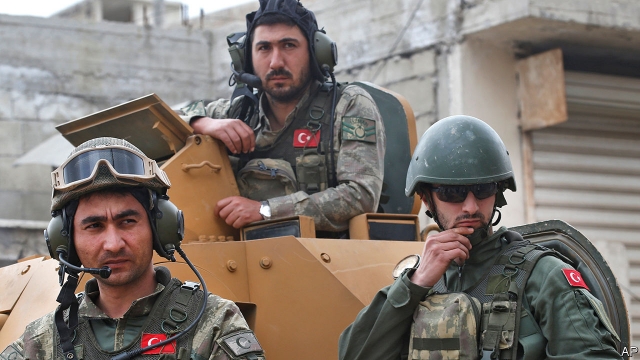Turkey struggles to keep the peace in Afrin

THE scene in the centre of Afrin, a Kurdish city in north-western Syria, hardly inspires confidence in the future. A destroyed statue of a mythical Kurdish hero is a reminder of the plunder of the city after its capture earlier this year by Arab and Turkoman rebels backed by Turkish tanks, from Kurdish rebels. The teenage son of one of the Arab rebels peddles cigarettes, a rifle across his knees. Another rebel directs traffic. Turkey argues it saved Afrin from terrorists and boasts of opening schools and hospitals. Residents are not exactly brimming with gratitude. “The Turkish soldiers are behaving decently,” says a Kurdish merchant. “But the bearded ones are big trouble,” he adds, referring to Islamist militants. “They’ve stolen so much.”
More than 100,000 civilians, and scores of Kurdish fighters known as the People’s Protection Units (YPG), fled Afrin when the Turkish army and its proxies swept in. Turkey considers the YPG an extension of the Kurdistan Workers’ Party (PKK), which has fought an insurgency against it for three decades. The Turks insist they have no plans to annex Afrin, and pledge to withdraw as soon as Syria’s war ends.
But the changes wrought by the incursion may be hard to undo. Turkish ministers suggested Afrin would become a magnet for some of the 400,000 Syrian Kurdish refugees in their country. However, it is mostly Arabs pouring into the region. (The YPG has not helped, reportedly stopping displaced Kurds from going home.) During a tour of the city organised by Turkish authorities, your correspondent met refugees from Ghouta, the Damascus suburb bombed to ruins by Syrian and Russian warplanes. One wave of human misery was breaking over another.
Turkey’s president, Recep Tayyip Erdogan, does not intend to reverse the tide. He has threatened to take the war against the YPG into other parts of Syria. This puts him on a collision course with America, which teamed up with the Kurds against Islamic State (IS) and still sees them as insurance against an IS resurgence. (It denies their links to the PKK.) Mr Erdogan is not persuaded. “We have told all our allies and friends not to stand between us and terrorists,” he said earlier this year. The prospect of an escalation is not far-fetched. Insurgents allied with Turkey have clashed with American troops in eastern Syria.
Tensions between the two allies have recently eased. Under Turkish pressure, the Americans persuaded the YPG to withdraw from Manbij, which the Kurds captured from IS two years ago. Turkey and America also agreed to co-ordinate patrols. But Turkey now says that unless YPG forces east of Manbij disarm, it will be only a matter of time before Turkey attacks the group. “The plan is for the YPG to go without a fight, but if they want one we will give them one,” says one Turkish diplomat.
But Turkey may have bitten off more than it can chew. Security in Afrin is getting worse. A double bombing in June killed nine people. Reports of infighting and looting continue to surface. People in Afrin chafed under YPG rule, a local resident says, but the insurgents who followed are worse. “The Turks must make these monsters go home.”